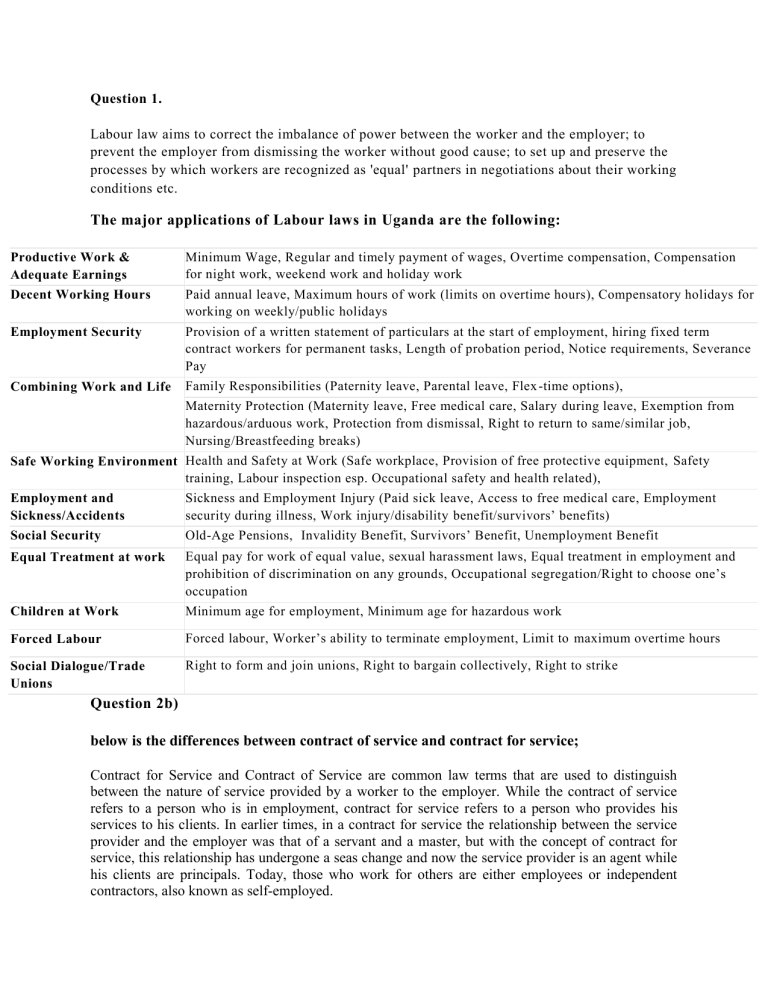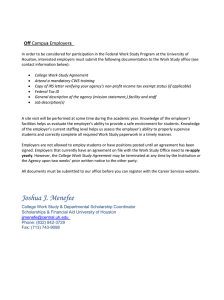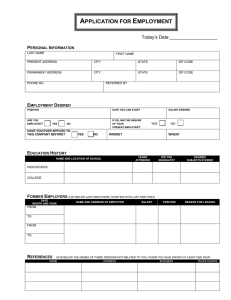
Question 1. Labour law aims to correct the imbalance of power between the worker and the employer; to prevent the employer from dismissing the worker without good cause; to set up and preserve the processes by which workers are recognized as 'equal' partners in negotiations about their working conditions etc. The major applications of Labour laws in Uganda are the following: Productive Work & Adequate Earnings Minimum Wage, Regular and timely payment of wages, Overtime compensation, Compensation for night work, weekend work and holiday work Decent Working Hours Paid annual leave, Maximum hours of work (limits on overtime hours), Compensatory holidays for working on weekly/public holidays Employment Security Provision of a written statement of particulars at the start of employment, hiring fixed term contract workers for permanent tasks, Length of probation period, Notice requirements, Severance Pay Combining Work and Life Family Responsibilities (Paternity leave, Parental leave, Flex -time options), Maternity Protection (Maternity leave, Free medical care, Salary during leave, Exemption from hazardous/arduous work, Protection from dismissal, Right to return to same/similar job, Nursing/Breastfeeding breaks) Safe Working Environment Health and Safety at Work (Safe workplace, Provision of free protective equipment, Safety training, Labour inspection esp. Occupational safety and health related), Employment and Sickness/Accidents Sickness and Employment Injury (Paid sick leave, Access to free medical care, Employment security during illness, Work injury/disability benefit/survivors’ benefits) Social Security Old-Age Pensions, Invalidity Benefit, Survivors’ Benefit, Unemployment Benefit Equal Treatment at work Equal pay for work of equal value, sexual harassment laws, Equal treatment in employment and prohibition of discrimination on any grounds, Occupational segregation/Right to choose one’s occupation Children at Work Minimum age for employment, Minimum age for hazardous work Forced Labour Forced labour, Worker’s ability to terminate employment, Limit to maximum overtime hours Social Dialogue/Trade Unions Right to form and join unions, Right to bargain collectively, Right to strike Question 2b) below is the differences between contract of service and contract for service; Contract for Service and Contract of Service are common law terms that are used to distinguish between the nature of service provided by a worker to the employer. While the contract of service refers to a person who is in employment, contract for service refers to a person who provides his services to his clients. In earlier times, in a contract for service the relationship between the service provider and the employer was that of a servant and a master, but with the concept of contract for service, this relationship has undergone a seas change and now the service provider is an agent while his clients are principals. Today, those who work for others are either employees or independent contractors, also known as self-employed. This bifurcation of workers has significance in many areas such as welfare, employment, and employee benefits. This classification is thus important in case of any dispute, unfair dismissal, leaves, redundancy etc. These actions are applicable only to employees which is the person who works under a contract of service. A contract is an agreement between two parties that clearly defines the rights and obligations of both parties, is legally binding and is mutually beneficial. Hence it is necessary to have the contract clearly defined in case of a dispute. People who work for contract for service are generally not entitled to any rights that are there for people who work under contract of service. These are people who are independent contractors having their own business and a fixed address. They have control over their business and they know what is to be done at what time, and how the job is to be carried out either personally os through others. These people can provide their service to more than one client at a time and such people usually provide for their own insurance cover. Question 2 c) Main Responsibilities of Employees Employees have responsibilities towards their employers, even if they work part time. These are the main responsibilities of employees: to personally do the work they were hired to do to do their work carefully and seriously (In some cases, they could be fired or disciplined if they’re often late for work, or if they’re absent too often or for no good reason.) to avoid putting themselves or others in danger to follow their employer’s instructions (There are some exceptions. For example, if an employer asks an employee to do something dangerous or illegal, the employee doesn’t have to follow these instructions. to be loyal and honest Main Responsibilities of Employees Employees have responsibilities towards their employers, even if they work part time or don’t have a written contract with their employers. These are the main responsibilities of employees: to personally do the work they were hired to do to do their work carefully and seriously (In some cases, they could be fired or disciplined if they’re often late for work, or if they’re absent too often or for no good reason.) to avoid putting themselves or others in danger to follow their employer’s instructions (There are some exceptions. For example, if an employer asks an employee to do something dangerous or illegal, the employee doesn’t have to follow these instructions. to be loyal and honest Employers’ Responsibilities Towards Employees These are the main ones: Employers must give their employees a place to work and make sure they have access to it. They must give them the tools, equipment and other things they need to do their work. Employers must pay their employees the salary and benefits they agreed to, including vacation, paid holidays and other types of holidays. Employers must make sure that working conditions protect their employees’ physical and psychological health and safety. In some cases, employers must give their employees written notice that their contracts are ending or that they are being laid off. Note that employers can pay employees a sum of money instead of giving the notice. Employers must treat their employees with respect. They must make sure their employees are not harassed or discriminated against. Employers must take steps when they know, or reasonably should know, that employees are exposed to domestic, family or sexual violence in the workplace. They must do this whether the employee is working in the office or working from home.





